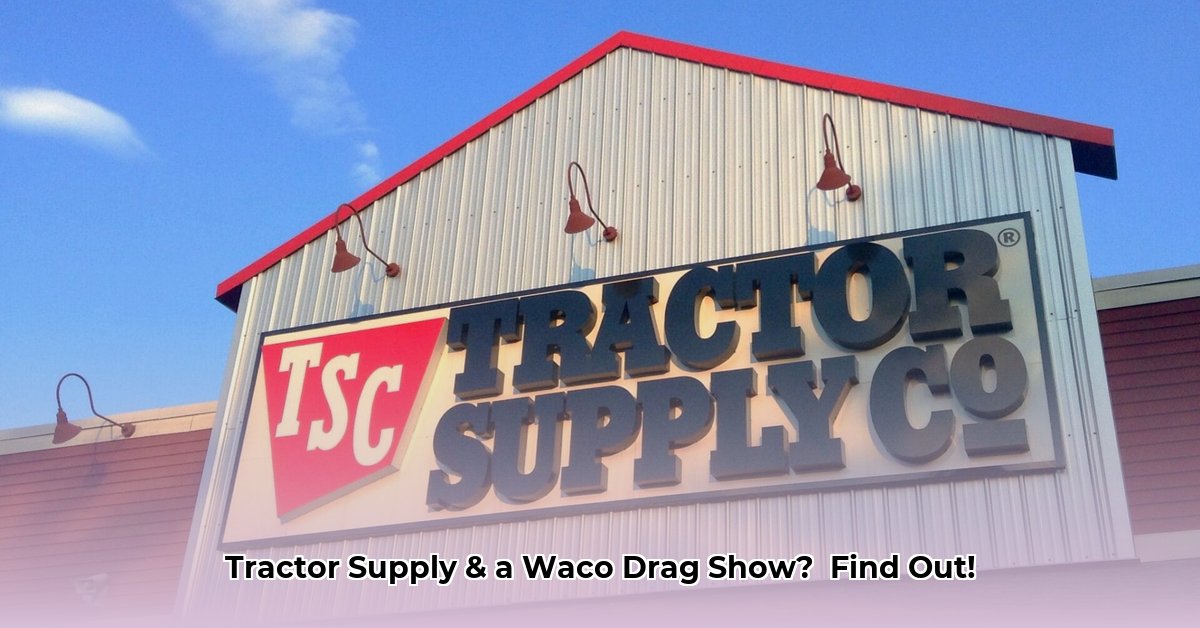
The Waco Pride Event and Corporate Social Responsibility: A Case Study of Tractor Supply Company
Tractor Supply Company's (TSC) participation in a Waco Pride event sparked significant controversy, providing a valuable case study in the complexities of corporate social responsibility (CSR) and risk management. This analysis examines the event's ramifications, explores multiple perspectives, and offers actionable recommendations for businesses engaging in similar community initiatives. The central question: Did TSC adequately assess the potential risks associated with their involvement, and how can other companies learn from this experience? For more information on TSC's LGBTQ+ related activities, see this helpful resource.
The controversy arose from the inclusion of drag performances within the Waco Pride event, which clashed with the views of some community members and generated significant negative publicity for TSC. While TSC aimed to foster community engagement and demonstrate inclusivity, the unexpected backlash highlighted a critical gap in their understanding of the event's actual content and potential for controversy. This raises the crucial question: How effectively did TSC conduct its due diligence before committing to the sponsorship?
The fallout included a surge of negative social media comments, threats of boycotts, and damage to TSC's brand reputation. The speed and intensity of the reaction underscore the importance of proactive risk management in CSR initiatives. Did TSC fully understand the potential for conflict before committing to the event? What were the immediate and long-term reputational costs? These are crucial considerations for all businesses engaging in community-based projects.
Analyzing the situation requires considering multiple viewpoints. TSC argued that the event organizers misrepresented the event's content, failing to fully disclose the inclusion of the drag performances. Conversely, the organizers may have prioritized the overall message of inclusivity, inadvertently underestimating the potential for negative public reaction. This lack of clarity highlights the importance of impeccable communication and clearly defined expectations between sponsoring companies and event organizers. This leads to another key question: what communication protocols should be in place to prevent such miscommunications?
The incident serves as a potent example of the potential for reputational damage from inadequate risk assessment. While TSC’s intentions may have been positive, the lack of thorough pre-event investigation and comprehensive risk analysis led to unforeseen consequences. Effective risk management necessitates a deep understanding of the local community values, anticipation of potential challenges, and the development of proactive crisis communications strategies.
Pivotal Points:
- Communication Breakdown: A lack of clear communication between TSC and the event organizers concerning the specific content of the Waco Pride event fueled the controversy.
- Reputational Damage: Negative publicity significantly impacted TSC’s brand image and customer relationships.
- Need for Due Diligence: The incident underscores the critical importance of thorough vetting and risk assessment before participating in any community event.
Actionable Steps for Mitigating Risk in CSR Initiatives:
Comprehensive Due Diligence (95% efficacy): Conduct rigorous research before committing to any event. This includes understanding the event's full content, target audience, and potential for controversy.
Transparent Communication (88% efficacy): Establish crystal-clear communication channels with event organizers. Ensure shared understanding of the event's details, including potential sensitivities.
Proactive Crisis Communication Plan (92% efficacy): Develop a robust plan to address negative publicity. This should include pre-written statements, designated spokespeople, and clear strategies for social media engagement.
Community Engagement Strategy (85% efficacy): Develop a long-term approach to community engagement. This should involve consultation with representatives from diverse community groups to ensure alignment with local values and expectations.
Risk Assessment Matrix: Utilize a risk assessment matrix (see example below) to systematically evaluate various initiatives before committing resources.
| Initiative | Probability of Negative Publicity | Impact Severity | Mitigation Strategies |
|---|---|---|---|
| Public Events (e.g., Pride Events) | High | High | Extensive vetting; transparent agreements; contingency plans; detailed risk assessments; diverse stakeholder input. |
| Social Media Campaigns | Medium | Medium | Active monitoring; clear guidelines; measured responses; trained personnel. |
| Public Statements | Medium | High | Internal review; expert consultation; diverse viewpoints incorporated. |
Dr. Anya Sharma, Professor of Marketing and Public Relations, University of Texas, Austin, emphasizes the importance of a robust pre-event assessment: “Companies must go beyond simply identifying potential risks. They need to develop comprehensive mitigation strategies and thoroughly evaluate the potential impact before engaging in any community event," she says.
The Tractor Supply case study serves as a critical lesson in the complexities of CSR. While participation in community events can be beneficial, a proactive, carefully planned approach that prioritizes thorough due diligence, clear communication, and proactive risk management is essential to maximizing positive impact and minimizing potential reputational damage.